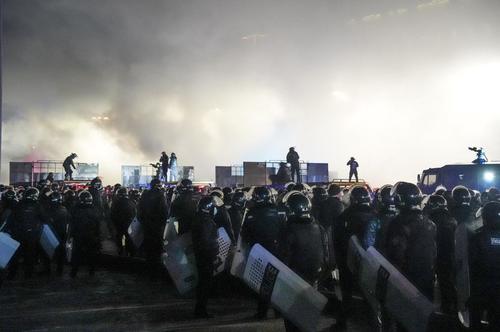State Of Emergency Declared In Kazakhstan's Largest City After Fuel Price Riots, Internet Cut
Large-scale protests in Kazakhstan are growing more fierce by the day, with video emerging from major cities showing police vehicles being attacked and set on fire, as authorities try to clamp down on a third consecutive day of rage against a sudden rise in fuel prices after authorities lifted price caps on liquefied petroleum gas (LPG).
In what marks an very rare example of mass public dissent in the former Soviet republic which has one-party rule, protests which erupted last weekend centered in the oil-rich western Mangystau region have now spread across multiple towns and cities including several oil-producing hubs.

Kazakh President Kassym-Jomart Tokayev is warning citizens against violating a blanket protest ban order, while also urging dialogue.
Even before the energy crisis this week, large political assemblies were only permitted by filing a legal request from authorities, underscoring the unprecedented nature of people taking to the streets en mass. Overnight, authorities have declared a "state of emergency" for Almaty.
Rapidly spinning out of control...
Almaty: protesters pelting armored vehicles with bricks, making military convoy to retreat https://t.co/69auCwhtJv pic.twitter.com/TqrWF5Kn3X
— Liveuamap (@Liveuamap) January 4, 2022
Situation in Almaty is spinning out of control. pic.twitter.com/JdDRpQDrjZ
— Status-6 (@Archer83Able) January 4, 2022
Local reports say a strict curfew of 11pm-7am has been imposed in Almaty. "Movements of private vehicles restricted. Entrance and exit from Almaty restricted," sources say.
Over the past days scenes have captured larger and larger crowds, in some cases appearing in the tens of thousands, taking over city streets.
Kazakhstan announced it would restore some fuel price after protests erupted in the country. There are reports that people now want the government to resign. Belarus propaganda obviously blames the West and social media for protests in Kazakhstan and says police should be violent pic.twitter.com/Ifz80EpXFC
— Hanna Liubakova (@HannaLiubakova) January 4, 2022
"Calls to attack government and military offices are absolutely illegal," Tokayev warned the country in a Tuesday video address. "The government will not fall but we want mutual trust and dialogue rather than conflict."
Yet judging by the on the ground footage continuing to spread on social media, and as protests reach the country's largest metropolis of Almaty - despite what now appears a significant disruption in national internet services - President Tokayev's appeal for calm is being met with rioting against security forces.
The footage coming out of Kazakhstan protests this evening is looking pretty dramatic pic.twitter.com/1qcP185AuO
— Shaun Walker (@shaunwalker7) January 4, 2022
#Atyrau: police vs protesters on the main city square. pic.twitter.com/Kqpg58JH2U
— Bota Jardemalie 🇰🇿🇧🇪🇪🇺 (@jardemalie) January 4, 2022
US regional sources have documented that "The price per liter of LNG jumped to 120 tenge (28 U.S. cents) at gas stations in Mangystau at the start of this year, compared with a price of 50-60 tenge (12-14 cents) in 2021." Thus overnight the price of taxi fares at least tripled in many places.
This in a country where the average household might make the equivalent of $250 a month, and where minimum wage equals just over $65 per month. There are now fears the crisis could get worse if protests grip oil-producing hubs to the point of affecting domestic output.
Oil industry employees join protests in Kazakhstan pic.twitter.com/XDQb3jb7nd
— Russian Market (@russian_market) January 4, 2022
⚠️ Confirmed: Internet significantly disrupted in #Kazakhstan as protests against energy prices reach #Almaty; real-time network data show impact to multiple providers with high impact to mobile services including Beeline; incident ongoing 📉
— NetBlocks (@netblocks) January 4, 2022
📰 Report: https://t.co/Op5GwzXKbh pic.twitter.com/i1LdjytaOp
Generally protesters have been demanding that the price of gas be brought back down to the 60 tenge range.
Meanwhile, mass arrests are being reported are expected to grow as the government struggles to stamp out the protests...
Протесты в Казахстане нарастают
— Медиазона. Беларусь (@mediazona_by) January 4, 2022
На видео силовики затаскивают протестующих в автозак в Алматы. Там сейчас не работают без VPN Telegram и WhatsApp
Видео: Vласть pic.twitter.com/TsXQaBpMN1
Last week, analysis in The New York Times linked the potential for coming unrest in Central Asian societies to Europe's own energy price crisis: "Attracted by high prices, energy companies are instructing ships carrying liquefied natural gas to change their destinations from Asia to Europe, but even that switching may not be enough to replace Russian gas or significantly ease the crunch."
For now it appears the authorities are preparing for a major crackdown...
⚡️The decree restricts entry to and exit from Almaty. #Kazakhstan https://t.co/Srb3oMUKJ8
— Ali Özkök (@Ozkok_A) January 4, 2022
On big question remains in terms of potential immediate impact on capital markets. For the past couple years Kazakhstan has had the highest uranium production in the world. For example in 2019, the country was responsible for a whopping 43% of the world's uranium supply, and has remained hands down the top global producer. Needless to say, if the unrest grows to a full-blown political crisis, this could send uranium prices soaring.
https://ift.tt/3pSVUwM
from ZeroHedge News https://ift.tt/3pSVUwM
via IFTTT




0 comments
Post a Comment